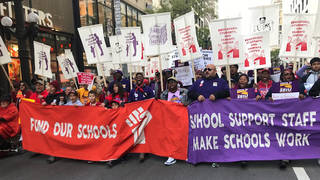
By Amy Goodman & Denis Moynihan
In West Virginia, striking public school teachers and staff celebrated a victory this week, inspiring educators outside their state to take action for better pay and working conditions. Their nine-day wildcat strike — the longest in recent West Virginia history — put in stark relief another national debate on teachers: President Donald Trump’s plan to arm teachers with concealed firearms in the aftermath of the Valentine’s Day school massacre in Parkland, Florida. As the Broward County Public Schools Superintendent Robert Runcie said at a CNN town hall after that mass shooting: “We don’t need to put guns in the hands of teachers. … We need to arm our teachers with more money in their pocket.” That’s exactly what teachers in West Virginia went on strike for, and why teachers from England to Oklahoma, are doing the same thing: organizing, engaging in collective bargaining and, if needed, striking for decent pay, benefits and a properly funded education system that serves their students, as well.
West Virginia is Trump country; he won with 68 percent of the vote, beating Hillary Clinton by more than 40 percentage points. Yet the Mountain State has a long history of militant labor activism, dating back to the coal wars in the early 20th century. “Almost every West Virginian knows somebody who’s been on strike — parents, grandparents, friends, aunts, uncles, just somebody,” striking middle school teacher Jay O’Neal, from Charleston, West Virginia, told us on the “Democracy Now!” news hour. “People know what it means to be on strike.”
The wildcat strike, illegal under West Virginia law, involved more than 20,000 teachers and 13,000 school staffers. Strikers were concerned that many West Virginia schoolchildren, 1 in 4 of whom lives in poverty, are dependent on meals provided at school. “At my school something like 70 backpacks full of food were sent home with kids,” O’Neal explained. “We also sent home flyers for churches and community centers that had organized food and meals for them. We are in a high-poverty state. Most of our kids depend on breakfast and lunch coming from school.” The writer Barbara Ehrenreich, known for her perennial best-selling book on American poverty, “Nickle and Dimed,” wrote about the food backpacks, “This is our dystopian welfare state: severely underpaid teachers trying to keep poverty-stricken kids alive.”
After nine days on strike, the teachers won. The Republican-controlled House of Delegates, Senate and governor agreed to a 5 percent raise and a freeze on health insurance costs, while a task force that includes teachers and union members works on a health insurance funding plan. The 5 percent raise applies not only to teachers, but to all state employees in West Virginia. Gov. James Justice also agreed to another demand of the strikers, pledging not to cut the state Medicaid budget in order to pay for the raise.
Speaking to us from Pittsburgh, labor journalist Mike Elk talked about the strike’s impact elsewhere: “The Pittsburgh Federation of Teachers voted to strike last Monday. … By that Wednesday, the school district had folded and given them everything they wanted.” Graduate students at the University of Illinois, Urbana-Champaign, are in their second week of a strike. Across the Atlantic, tens of thousands of lecturers and other university workers are on strike. Priya Gopal, university lecturer in Cambridge, England, told us, “We were very, very heartened to see that striking teachers in West Virginia posted a picture of themselves holding up a placard sending us solidarity … there is a kind of collective awareness now in Britain and in America that these struggles are really against the erosion of the idea of education as a public good.”
The West Virginia strike inspired teachers in Oklahoma, where, by many measures, teachers earn the lowest in all 50 states. Teresa Danks, a Tulsa elementary school teacher, made headlines last year by panhandling on the street to raise money for schools. “On top of our low salaries, our high insurance and all the other problems that are happening in the classroom,” she told us, “teachers are paying out of pocket for everything.” A Facebook group calling for a statewide teacher walkout in Oklahoma quickly grew to 45,000 members. A strike is scheduled for April 2. Similar labor actions are brewing in Kentucky.
Many student walkouts will be happening as well this spring, in response to the mass shooting at Marjory Stoneman Douglas High School in Parkland. Teachers nationwide are now armed – not as President Trump would have them, with concealed firearms, but with collective bargaining power and the willingness to strike.










Media Options